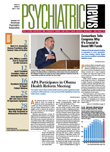Our dues should be spent on projects that affect the world outside: to recruit medical students into psychiatry; inspire our residents; help our members attain and maintain knowledge and skills and board certification; increase the diversity of our workforce; educate the public and decision makers about our unique expertise; advocate for psychiatric research, training, care, and reimbursement—all this is in the service of our patients and the mental health of our society. We want to spend only enough inside, on our own governance, to achieve these ends.
Last year I discovered that, in addition to our Board and Assembly, APA had more than 90 components: committees and councils. We have tended to form a permanent committee or council every time we identify an issue as important. Some very useful products, like our new guide on patient safety, “SAFE MD: Practical Applications and Approaches to Safe Psychiatric Practice,” have come from our components. Many dedicated APA members have served on components over the years, and hundreds are serving as I write. However, setting up a permanent component is not the only or even the best way to address the importance of an issue, and travel and staff time make components expensive. Consequently, I appointed a Board work group to look at all our governance and make recommendations for a reorganization. The working group was chaired by Dr. Alan Schatzberg, currently APA president-elect, and Dr. Ronald Burd, speaker of the Assembly. At its March 2009 meeting, the Board considered and adopted many of the recommendations of the work group (see
Board Enacts Big Reduction in Governance Structure).
As a result, we will consolidate the work of most of our components into nine councils, which will be charged with most of the functions of the committees they used to oversee.
The councils are Adult Psychiatry; Children, Adolescents, and Their Families; Communications; Advocacy and Government Relations; Healthcare Systems and Financing; Minority Mental Health and Health Disparities; Psychiatry and Law; Medical Education and Lifelong Learning; Research and Quality Care.
Task forces of experts and stakeholders will be appointed to perform specific tasks as they are needed. The bulk of the work will be carried out via electronic communication. Most of the other current committees will sunset at the end of next month's annual meeting, though some will continue working to complete projects.
I have been working with our information technology department to develop a more inclusive and accessible way for members to address the issues we care about. We will establish Web-based groups that can accommodate all interested members; the groups can generate draft policies and projects for consideration by the Board and Assembly, as the committees have in the past.
The Board will also reorganize to improve efficiency and lower costs. We will eliminate the position of vice president and two trustees-at-large, add a second voting member-in-training, and maintain the trustee position for an early career psychiatrist. The elected chair of the Assembly Committee of Representatives of Minority and Underrepresented Groups will sit on the Board and have a vote. The Assembly will undergo a budget cut and is in the process of deciding how to reorganize. We recognize that we may have to make changes as we see how the new structure works out.
This is a good time to economize. The relationship between APA and the pharmaceutical industry has been a concern to many members. I appointed another work group in March 2008 to inform the Board about the amounts and kinds of revenue we receive from pharmaceutical companies and the activities the revenue supports and to offer options for decreasing that revenue. The group began its work before the issue attracted major negative attention by the government and media. Last month, the Board voted to phase out industry-supported symposia and meals at our scientific meetings. During the past year, the world economy suffered great losses, and pharmaceutical companies significantly reduced their advertising expenditures. The Board has voted to set up a work group to rethink and recast APA's relationships with industry, and the Assembly will consider guidelines for the relationships of individual psychiatrists with industry at its May meeting. The process of reorganization was not undertaken to save money, but now we need to. We are determined to maintain our mission, our financial reserves, and a balanced budget.
The Board has devoted a year of consideration and planning to these important decisions. I wrote about these issues, and solicited your feedback, in earlier columns of mine. We know that the changes will not be universally popular. The component meetings provided collegiality and stimulation. But we can address important issues without maintaining a permanent component for each one. Our younger colleagues prefer focused tasks carried out by electronic communication. Our internal governance exists only to affect the external world: to help us prevent, diagnose, and treat the psychiatric conditions that inflict pain and disability on millions of suffering people.▪

